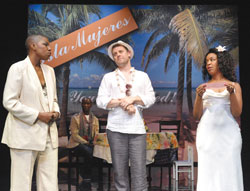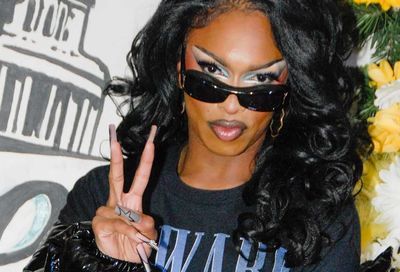Candy Land
Robert O'Hara's snazzy, saucy Bootycandy is a bracingly in-your-face provocation that is as funny as it is disturbing
”The work should be work,” admonishes playwright-director Robert O’Hara‘s semi-autobiographical avatar in Bootycandy, a collection of 10 short plays receiving a snazzy, saucy world-premiere production at Woolly Mammoth.
The character, portrayed by Phillip James Brannon, is speaking his mind during a conference panel with other black writers who are equally weary of easy, limiting labels – based on race, gender, sexuality, what have you – used to define them and their creations. It’s a mantra that exudes from Bootycandy itself, a bracingly in-your-face provocation that is as comfortable and confident drawing hearty laughs from minstrel-esque racial stereotypes as it is hurtling headfirst into disturbing realms of human desire and cruelty.

Booty Candy
Yet even the lightest moments don’t let you off easy. When seemingly poor, trash-talking black women (Jessica Frances Dukes and Laiona Michelle) are hootin’ it up at the expense of one’s sister, who has decided that there’s no more beautiful name for her unborn child than Genitalia, just try holding back your snorts and giggles. But is it really okay to laugh? Shouldn’t you – shouldn’t someone – be offended?
The playwright apparently isn’t, just as he’s fine with introducing Genitalia later as a gruff, grown-up, shaved-head bull dyke (Michelle again; out of five actors, she and Dukes are the only women) who has returned to her beachfront commitment-ceremony site to exchange much less civil vows: a breakup ritual with her floozy of a femme partner. The verbal sparring is a stitch, but again, no laugh comes without a residue of unease.
It’s not that O’Hara is incapable of subtlety. As his stand-in, known as Sutter, Brannon frequently has to command the stage with a dead-serious dramatic grip, which never falters. The character is introduced on a relatively silly note: as a ’70s, Michael Jackson-loving child in Superman Underoos, unwittingly terrorizing his mother (Dukes) with a litany of questions about his penis, which he has been taught to refer to as ”bootycandy.”
Later, though, we see Sutter as a flamboyant ’80s teen trying to articulate to his family the threat he senses from a man who has begun following him home from school. The response is a different litany: all the things Sutter should give up – watching Star Search and Entertainment Tonight, avoiding sports, reading Jackie Collins novels – that are surely contributing to the effeminacy that makes him appealing prey to a street-stalking chickenhawk.
And the adult Sutter wades into deeper waters, still, when he becomes embroiled in a gay affair that explodes boundaries of race, marital fidelity, familial allegiance and more. Sean Meehan, as the paramour, Roy, is the show’s lone white actor, who has to match Brannon at every dramatic turn, and he does so impeccably.
Brannon has to strip himself emotionally, excruciatingly bare in the toughest scenes; and Meehan, as another character, Clint, has to strip himself physically bare as well, exposing himself – literally – in an outrageous way that would certainly make lesser actors flinch (and will certainly make audience members of lesser constitutions flinch, too).
The caliber of the cast is nothing short of impeccable, really. Lance Coadie Williams rounds out the ensemble in roles including a fiery preacher with quite a surprise for his conservative congregation, and – in an effective bit of gender twisting – Sutter’s equally fiery grandmother.




To June 26
Woolly Mammoth Theatre Co.
641 D St. NW
$35-$65
202-393-3939
woollymammoth.net
If the boundaries in Sutter’s life – between right and wrong, pain and pleasure – have perhaps blurred to the point of imperceptibility, so, too, for the playwright, have the very boundaries of theater itself. The most troubling scene, about Sutter and Clint’s involvement in a casual encounter that goes wretchedly wrong, pushes the actors to the point of stopping the play, throwing up a big ”Don’t go there” in a work that otherwise seems to boast that there’s nowhere it won’t go.
So, what gives? Sutter resets the play on a different track, and if it’s easy answers you’re after, look elsewhere. Remember: ”The work should be work.” Piece together the threads of the same characters who pop up throughout the show. Are they always literally the same people? (I’m still mulling over Roy and Clint’s brotherly connection and how it fits into the tragic situation that stops the show in its tracks.)
Yes, Bootycandy is work – for the actors, for the audience – but it feels like playtime for everyone.
Support Metro Weekly’s Journalism
These are challenging times for news organizations. And yet it’s crucial we stay active and provide vital resources and information to both our local readers and the world. So won’t you please take a moment and consider supporting Metro Weekly with a membership? For as little as $5 a month, you can help ensure Metro Weekly magazine and MetroWeekly.com remain free, viable resources as we provide the best, most diverse, culturally-resonant LGBTQ coverage in both the D.C. region and around the world. Memberships come with exclusive perks and discounts, your own personal digital delivery of each week’s magazine (and an archive), access to our Member's Lounge when it launches this fall, and exclusive members-only items like Metro Weekly Membership Mugs and Tote Bags! Check out all our membership levels here and please join us today!





















